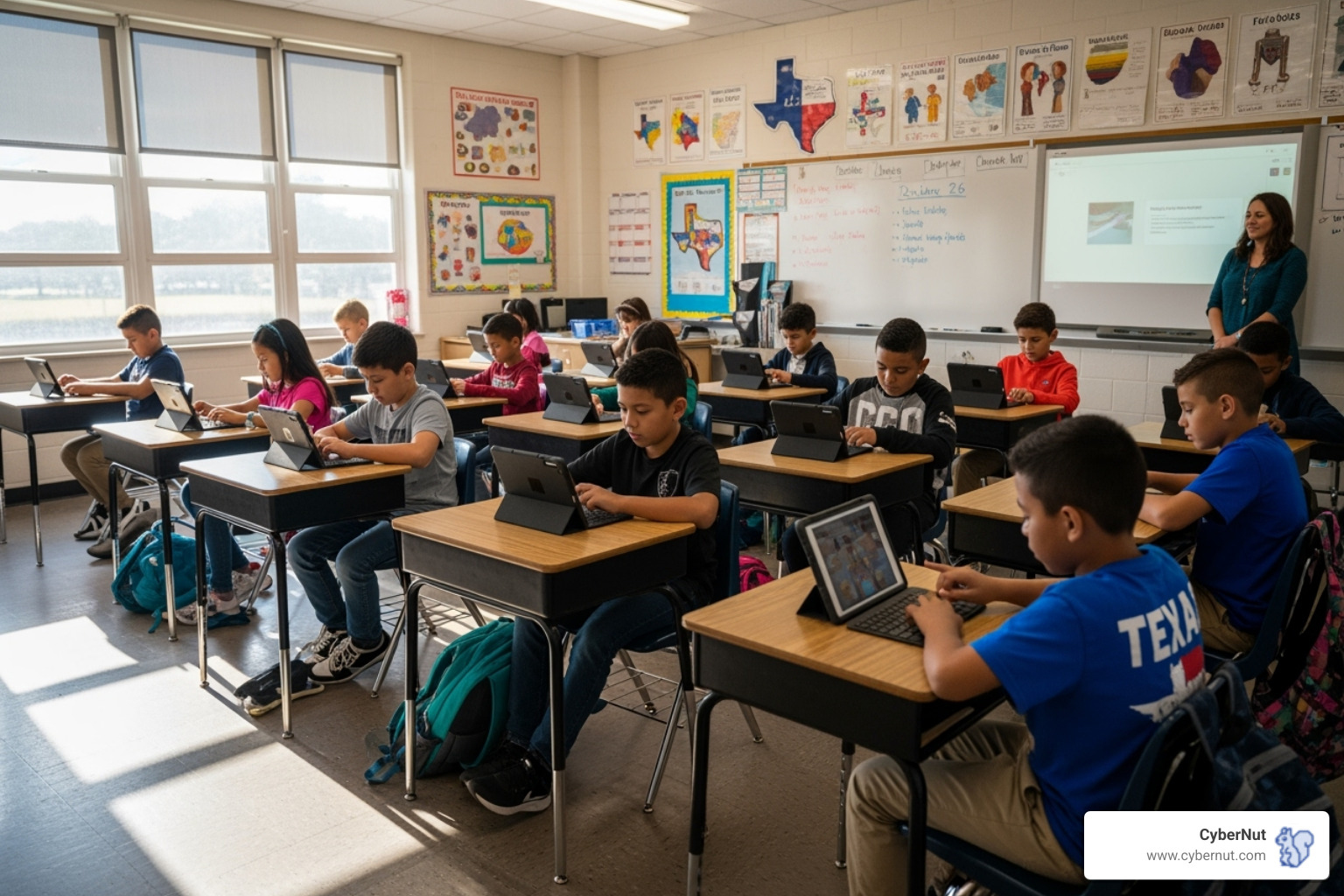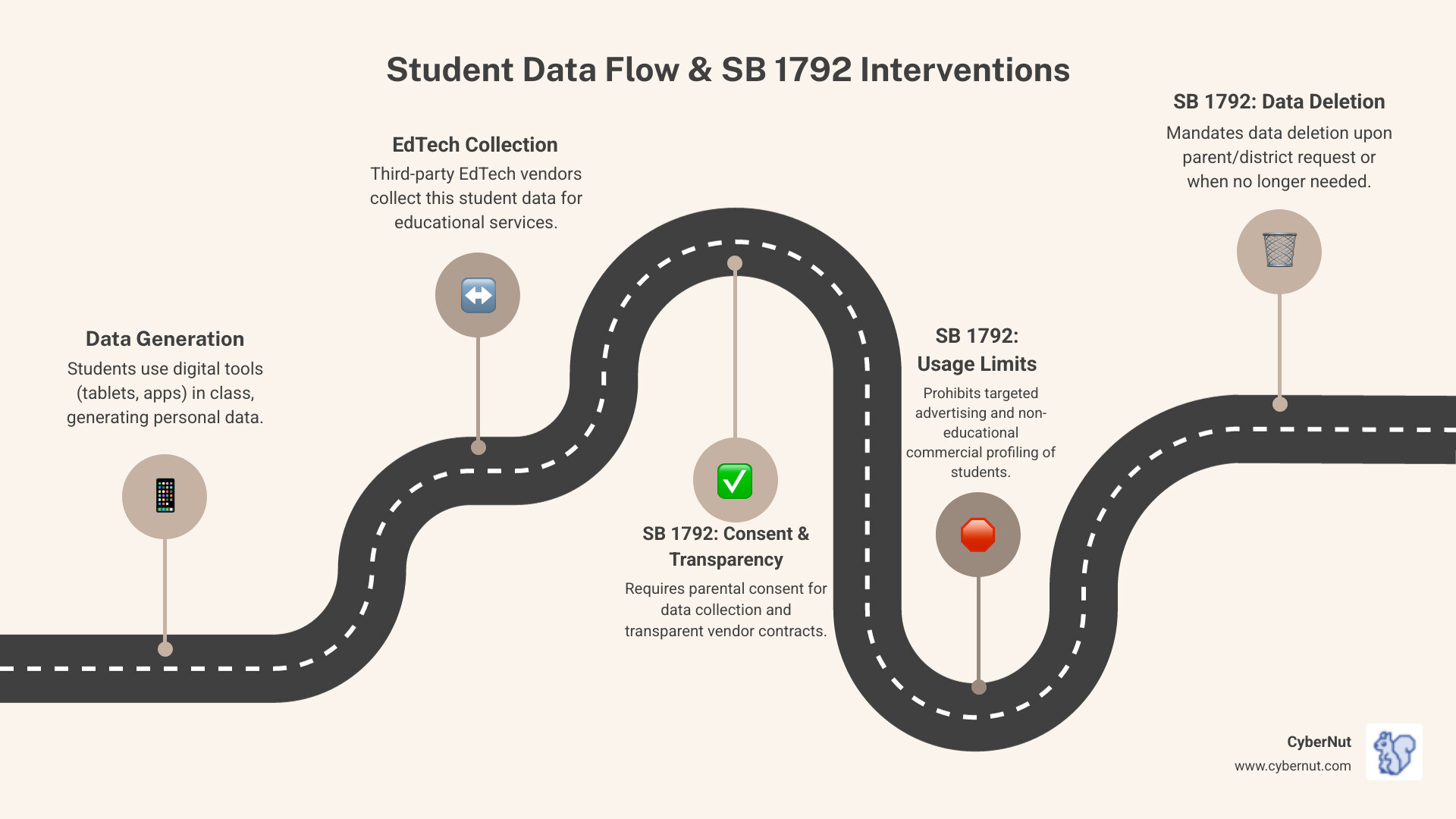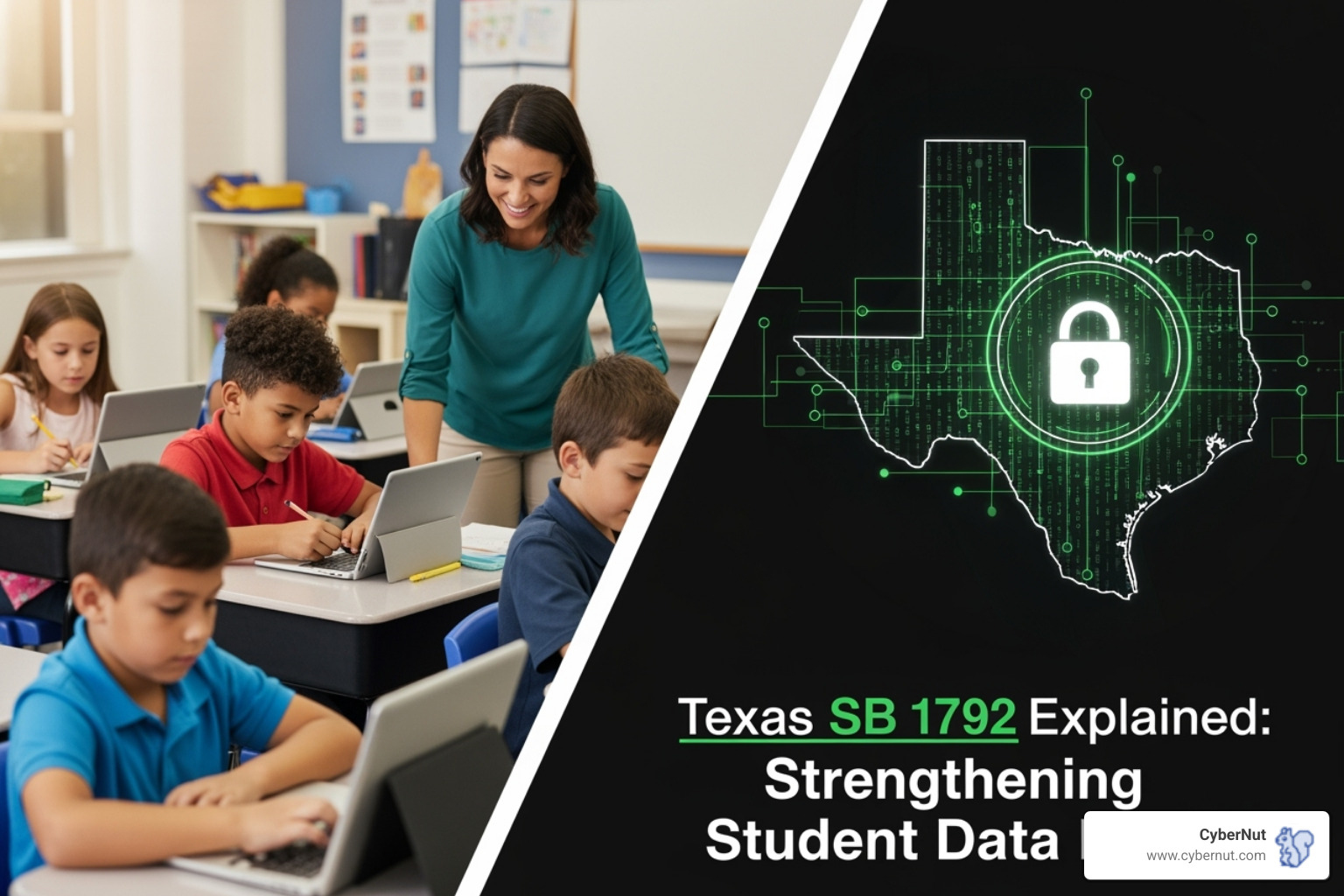
Oliver Page
Case study
September 26, 2025

Texas SB 1792 Explained: Strengthening Student Data Privacy in the Classroom represents a landmark shift in protecting student information. Passed in 2017, this law mandates that educational technology vendors are transparent about data collection, obtain proper consent, and are prohibited from using student data for advertising or non-educational profiling.
Key provisions of Texas SB 1792:
Before SB 1792, the vast amount of digital data students generated daily on learning apps and online platforms often flowed to third-party vendors with little oversight.
The law creates shared responsibility between school districts, EdTech vendors, and parents. Districts must vet technology partners carefully, and vendors face strict limits on data collection and use.
For K-12 IT directors, SB 1792 introduces key compliance requirements and a clear framework for evaluating EdTech partnerships to protect students.

Texas SB 1792 Explained: Strengthening Student Data Privacy in the Classroom terms you need:
In 2017, as Texas classrooms acceptd digital learning, a significant concern emerged: student data was flowing to third-party companies with little oversight or transparency.
In response, the 85th Legislative Session passed Texas SB 1792. This legislation stemmed from concerns among parents, educators, and lawmakers about the collection and sharing of sensitive student information without proper safeguards. Before this law, the EdTech landscape lacked clear rules, and schools often adopted tools without fully understanding the data privacy implications. Texas SB 1792 Explained: Strengthening Student Data Privacy in the Classroom represents the state's commitment to changing this dynamic.
The law's mission is to establish clear boundaries for how EdTech companies handle student information while giving parents meaningful control over their children's data. It is an essential piece of the puzzle discussed in K-12 Cybersecurity: Protecting Schools from Evolving Threats.
For the exact legal language, see the Official text of Texas SB 1792.
At its core, SB 1792 champions two principles: transparency and parental control. It ensures parents know what information is collected about their children, how it's used, and who can access it.
The law requires EdTech companies to provide clear, understandable information about their data practices, moving away from burying details in lengthy terms of service. This transparency empowers parents by giving them explicit consent rights regarding their child's data. The goal is to limit unnecessary data collection and prevent data misuse, ensuring student information is used only for educational purposes.
SB 1792 builds upon the foundation of existing laws like the What to Know About the Texas Student Privacy Act: ED Code 32.151 to create a comprehensive privacy framework.
The law protects "covered information" or Personally Identifiable Information (PII)" with a wide net, recognizing that various data points can be combined to create detailed student profiles.
Protected data includes basic identifying information (name, address, student ID) and extends to academic and behavioral records like grades, disciplinary actions, and attendance. The law also safeguards sensitive health records, medical information, photos, videos, and audio recordings.
Furthermore, online activity data (browsing history, search queries), biometric information (fingerprints, facial scans), and geolocation data are all covered. If information can identify, contact, or locate a student, or relates to their educational or medical history, SB 1792 considers it protected.
SB 1792's legal mandates for EdTech companies create a secure environment for student data.
Contract requirements are foundational. Agreements between schools and vendors must detail how data is collected, used, and protected, including specifics on data ownership and security measures.
Data security measures are mandatory. Companies must implement and maintain reasonable security procedures to protect student data from unauthorized access, use, or destruction, aligning with the challenges in Cybersecurity Risks: Protecting K-12 Schools from Evolving Threats.
Crucially, SB 1792 explicitly prohibits targeted advertising using student data. A student's academic performance cannot be used to market commercial products.
The law also bans creating student profiles for non-educational commercial purposes. Companies cannot aggregate student data to sell or create commercial profiles.
Data deletion requirements mandate that vendors must generally delete student information when a student leaves a district or upon request.
Finally, companies cannot sell or disclose student data for commercial purposes without explicit parental consent, closing a major loophole.

Texas SB 1792 Explained: Strengthening Student Data Privacy in the Classroom establishes a partnership between schools and families. Alongside new rules for EdTech companies, the law assigns key responsibilities to school districts and parents, creating a three-part framework for effective student data privacy.
This collaborative approach is vital in today's complex school technology environment. With students interacting with multiple digital platforms, cooperation is necessary to protect them. The law empowers schools and parents with clear responsibilities and rights, creating multiple layers of protection, which aligns with strategies in our Cybersecurity Insights for Texas School Districts.
Texas school districts now have a more active role in protecting student data. SB 1792 requires them to carefully vet any technology partner's privacy and security practices before adoption.
Vetting third-party operators is a critical responsibility. Districts must investigate each vendor's data practices, security measures, and compliance with Texas law, and document their findings.
Ensuring compliant contracts is another key duty. All agreements with EdTech vendors must explicitly address SB 1792 requirements, including data collection limits, security standards, and deletion procedures. Districts must negotiate terms or find another provider if a contract is non-compliant.
Providing notice to parents about technology choices is required. This transparency about which platforms are used and what data is collected builds trust and allows parents to ask informed questions.
Districts must also facilitate parental access to their child's data, acting as a bridge between families and vendors to coordinate requests and ensure prompt responses.
Finally, creating comprehensive data security plans is essential. As mandated by All About Texas SB 820: Cybersecurity Policies Required in Every School District, these plans must cover vendor management, internal data handling, staff training, and incident response.
SB 1792 gives parents legal rights to understand and control how their child's information is used by EdTech companies.
Your right to review student data allows you to see what information a third-party vendor has collected, from quiz scores to app usage time.
Requesting corrections to inaccurate data ensures your child's digital record is accurate. You have the legal authority to demand fixes to errors in grades, attendance, or other information.
Consenting to data collection puts you in control. While core educational functions may not require extra consent, vendors must get permission for data collection beyond these activities.
Requesting data deletion gives you a "right to be forgotten," allowing you to have data removed when your child changes schools or when it's no longer needed. This is increasingly important with the rise of educational AI, as discussed in AI in the Classroom: Balancing Innovation with Cybersecurity.
These rights are most effective when parents stay engaged with their school and ask questions about the technology used in the classroom.

Texas SB 1792 Explained: Strengthening Student Data Privacy in the Classroom does not exist in isolation. It works with federal regulations and other state laws to create a comprehensive shield for student data.
If federal laws like FERPA are the foundation, SB 1792 builds stronger walls. This layered approach, while requiring an understanding of multiple rule sets, offers far greater protection for students. This commitment to digital safety is similar to Texas HB 3834 Explained: The Law That Mandates Cybersecurity Training for Educators, which ensures staff can protect the data these laws safeguard.
The Family Educational Rights and Privacy Act (FERPA) has been the standard for student privacy since 1974, but it wasn't designed for today's digital world. SB 1792 modernizes these protections. While FERPA focuses on educational records held by schools, SB 1792 specifically targets student data collected by third-party EdTech operators.
SB 1792 improves, rather than replaces, FERPA. Together with other Texas Education Code provisions, they create a robust "privacy fortress" around student data.
The real-world impact of SB 1792 includes both benefits and challenges.
Benefits are substantial: increased trust between schools and families, a safer digital learning environment free from targeted advertising, and improved protection from data misuse. Districts also gain clearer guidelines for vetting EdTech tools.
Implementation challenges are also real. Resource allocation is a concern for districts, as vetting vendors and managing requests takes time and expertise. For EdTech vendors, adapting to Texas-specific requirements can increase costs. The biggest ongoing challenge is keeping pace with evolving technology and threats, as highlighted by the fact that many Schools Unprepared for AI Cyber Threats: A Growing Crisis in Education.
Despite these problems, the benefits for student privacy are significant.
Texas SB 1792 Explained: Strengthening Student Data Privacy in the Classroom has strong enforcement mechanisms.
The Texas Attorney General is the primary enforcer, with the power to investigate and act against non-compliant third-party operators. Violations can be treated as deceptive trade practices, opening the door to injunctive relief, civil penalties, and damages.
Penalties for non-compliance are significant, including large fines and legal actions that can impact a company's ability to operate in Texas. This creates a strong financial incentive to comply. While the Attorney General targets operators, districts must still perform due diligence in vetting vendors to avoid their own legal and reputational risks.
This robust enforcement is critical given today's sophisticated threats, such as those detailed in Generative AI in the Wrong Hands: How Hackers Target K12 Districts. The message is clear: protecting student privacy is the law in Texas.

Understanding new privacy laws can be complex. Here are answers to common questions about Texas SB 1792 Explained: Strengthening Student Data Privacy in the Classroom.
No, SB 1792 does not apply to all software used in schools. The law specifically targets "operators" of websites, online services, or applications that are primarily designed and marketed for K-12 school purposes and collect "covered information" (personally identifiable data) from students.
An educational app for reading comprehension is likely covered, but a general-purpose word processor or public search engine is not. The key is whether the software is made for schools and collects sensitive student data. If yes, SB 1792's protections apply.
Your first point of contact should be your child's school district. Start by contacting the school office or the district's IT department to request a review of the personally identifiable information collected by third-party EdTech vendors.
Under SB 1792, the school district is legally required to facilitate this request. The district will then work with the relevant EdTech companies to gather your child's data. You have the right to review this information, request corrections for inaccuracies, and ask for the data to be deleted in certain situations. The law exists to empower parents to stay informed.
Texas takes violations of SB 1792 seriously. The Texas Attorney General's office handles enforcement and has the authority to investigate companies that misuse student data or fail to meet their security and contractual obligations.
Violations can be treated as deceptive trade practices under the Texas Deceptive Trade Practices-Consumer Protection Act. This can lead to significant consequences, including legal action and substantial monetary fines. The penalties are designed to be a powerful deterrent, ensuring EdTech vendors have a strong incentive to follow the rules. If you suspect a violation, you can report it to the Texas Attorney General's Consumer Protection Division.
The digital change of education is permanent, and Texas SB 1792 Explained: Strengthening Student Data Privacy in the Classroom provides a roadmap for safety. This law is more than a compliance checkbox; it fundamentally changes the approach to student data. By prioritizing transparency, parental control, and vendor accountability, Texas has set a high standard for student privacy.
SB 1792's power lies in its recognition that data privacy is everyone's job. School districts, parents, and EdTech companies must all take their roles seriously to create a strong, collaborative defense for student data.
However, laws are just the beginning. The real work happens in the daily decisions made by educators and staff, which is why a proactive cybersecurity posture is essential. We must build defenses to prevent problems before they occur.
Ongoing training is a critical part of this defense. Teachers and staff are the first line of defense, but they need the right knowledge to be effective. A single successful phishing email can undermine all of SB 1792's protections. Our Cybersecurity Training: Empowering K-12 Staff Against Cyber Threats is designed to make security awareness practical and engaging for educators.
As technology like AI and VR evolves, the principles of SB 1792 will become even more critical. The law provides a foundation to accept innovation while keeping student safety at the forefront.
CyberNut solutions are designed for this reality. We understand the unique needs and budget constraints of K-12 schools. Our custom, low-touch approach builds lasting security cultures that protect students.
The shared responsibility model of SB 1792 is its greatest strength. When the whole community pulls together, security improves for everyone.
Is your district truly secure against evolving threats? The best way to find out is to test your defenses. Get a complimentary phishing audit today to see where your vulnerabilities lie and take the first step toward building the secure digital future every Texas student deserves.

Oliver Page

Some more Insigths


Back